Back to School: Kids and Elderberry for Respiratory Viruses (Influenza, SARS-CoV-2). No COVID-19 Vaccines, No Flu Vaccines, No Need to Destroy Their Immune Systems with mRNA of Any Kind!
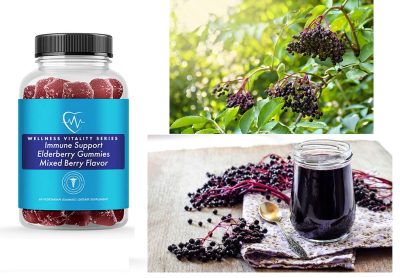
All Global Research articles can be read in 51 languages by activating the Translate Website button below the author’s name.
To receive Global Research’s Daily Newsletter (selected articles), click here.
Click the share button above to email/forward this article to your friends and colleagues. Follow us on Instagram and Twitter and subscribe to our Telegram Channel. Feel free to repost and share widely Global Research articles.
***
What Is Elderberry?
Sambucus nigra Linnaeus is a tree that grows in Western and Central Asia, Europe, and North Africa. Sambucus is a generic Greek name that comes from an ancient musical instrument built with the wood of this tree.
Elderberry is a blue-black colored fruit of the Sambucus tree, the European version of the 30 kinds of elder plants globally.
Therapeutic uses of Elderberry can be traced back to ancient times:

-
3000 B.C – 30 B.C: Ancient Egypt: Researchers have uncovered evidence that black elderberry may have been cultivated by prehistoric man, and there are recipes for elderberry-based preparations in the records of Ancient Egypt. The Ancient Egyptians used elderberry as an essential ingredient in their skincare regimen to enhance their skin complexion and glow.
- 2000 BC: Stone Age: Neolithic people cultivated the elderplant / elderberries. Seeds from elderberry found in Neolithic pole-dwellings in Switzerland suggest that the plant was in cultivation by about 2000 BC.
- 400 BC: Hippocrates – Greece: The ancient knowledge of Elderberry runs so deep that the “father of medicine”, Hippocrates (460 BC – 375 BC), adoringly referred to the herb as the “medicine chest” of all herbs because of its endless benefits and the usability of all aspects of the plant.
- 370 BC – 285 BC: Greco-Roman Period: The name if the plant dates back to the Greco-Roman period. The word Sambucus came from the Greek word Sambuca. Theophrastus (300’s BC) described elder in Historia Plantarum.
- 77 AD: Italy: By the time of Pliny the Elder, the medicinal qualities of elder were widely known and his writings notes this as well.
- 1600’s AD: Britain: Over the centuries, elderberry has been used to treat colds, flu, fever, burns, cuts, and more than 70 other maladies, from toothache to the plague. In the 17th century, John Evelyn, a British researcher, declared, “If the medicinal properties of its leaves, bark, and berries were fully known, I cannot tell what our country man could ail for which he might not fetch a remedy [from the elderberry], either for sickness or wounds.”
- North American First Nations: are said to have used elderberry going back thousands of years.
- Traditional Chinese Medicine: It is said that elderberry has been part of traditional Chinese medicine going back hundreds of years.
Elderberries have twice the Vitamin C of oranges and 3 times the anti-oxidants of blueberries. They are high in polyphenols and bioflavonoids.
The use of the elderberry and elderflower is common and widespread in Europe and modern science is now beginning a serious study of the plant’s properties and uses.
The elderflower extract standardized on flavonoids, is recorded in the European and British Pharmacopoeias. An elderflower monograph has been prepared by the World Health Organization. The European Medicines Agency has published a detailed assessment report on Sambuci fructus.
The flowers of the elderberry tree contain sugar, cyanogenic glycosides, phenolic acids, flavonoids, and pectin. Flowers have antiviral properties, diuretic, and mild anti-inflammatory effects and are used to treat colds.
The elderberry fruits have a high level of essential oils, flavonoids, and anthocyanin glycosides. They possess immuno-stimulatory, antiviral, and significant antioxidant activity to boost the immune system and act as a potent viral inhibitor to treat flu.
S. nigra also enhances the immune system in a nonspecific way and stimulates the generation of cytokines.
Elderberry and Influenza
Elderberry contains a high concentration of bioactive compounds, especially polyphenols such as flavonols, phenolic acids, proanthocyanidins, and anthocyanins, which give the fruit its dark-purple hue.
Elderberry has anthocyanins, a subset of flavonoids which have immuno-modulating and anti-inflammatory effects.
Anthocyanins can attach to and render ineffective viral glycoproteins that enable viruses to enter host cells, thereby having an inhibitory effect on viral infection.
Extracts of elderberry have demonstrated in vitro to have inhibitory effects on influenza A and influenza B viruses, influenza H5N1, as well as H1N1 swine flu virus.
Human clinical trials have shown that black elderberry extracts reduce symptom severity as well as the duration of influenza viral infections.
Elderberry and COVID-19
In the United States, elderberry supplements sales increased by 415% in the single-week period ending March 8, 2020.
In addition to its direct viral inhibitory effect (studied with Influenza), elderberry also affects the immune system through regulation of cytokines.
Elderberry appears to increase cytokine production at the first stage of viral attachment and early viral replication. This helps kill the virus and stop replication.
However, cytokine storm is a problem with severe COVID-19 infections and this was used by big pharma to cast doubts and concerns on the use of Elderberry to treat COVID-19.
A review by Wieland et al. concluded that there was no evidence that Elderberry overstimulated the immune system
Broduske et al. showed in March 2021 that Elderberry extract can bind the spike protein and inhibit SARS-CoV2 and ACE-2 binding.
Elderberry inhibits viral replication of SARS-CoV2 and increases production of pro-inflammatory cytokines IL-1, TNF-alpha, IL-6 and IL-8. TNF-alpha in particular improves macrophage activity against viral infection.
Elderberry anthocyanins also protect the endothelium which is attacked during COVID-19 infection:
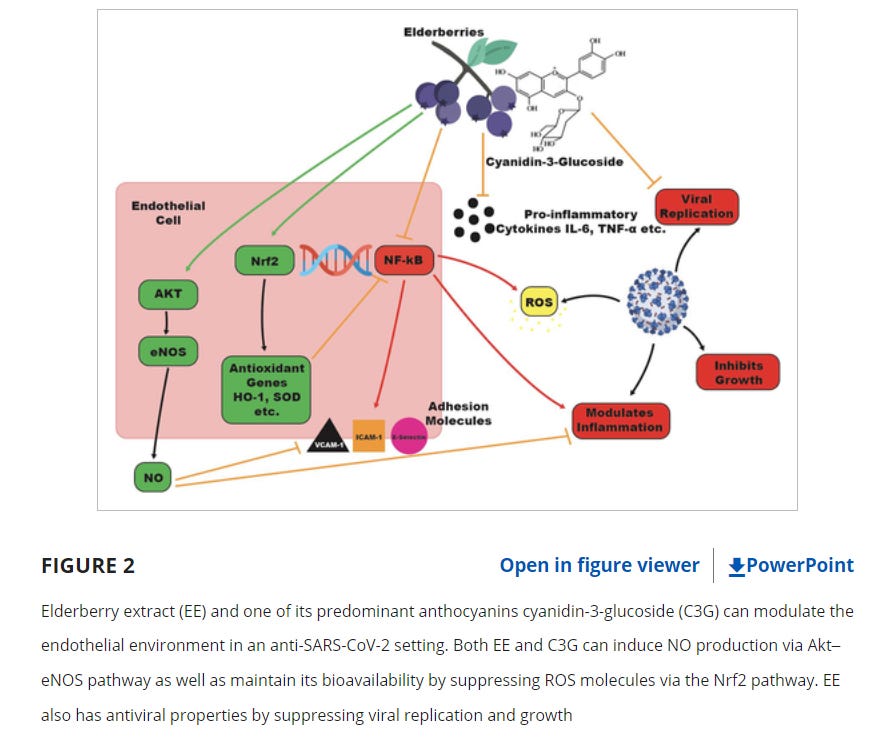
Elderberry in Kids
Dr.Gregory Weaver MD, a pediatrician at Cleveland Clinic Children’s in Cleveland gave an interview:
“In general, we have very few medications that treat viral illnesses,” says Gregory Weaver, M.D., a pediatrician at Cleveland Clinic Children’s in Cleveland. “There is some data that the actual components of elderberry have been looked at as either an anti-inflammatory drug and/or an antiviral drug. Specifically, there is a fair amount of data for influenza.”
Several studies have compared Tamiflu and elderberry for the purpose of lessening flu symptoms or reducing the risk of getting the flu after exposure. “There is a fair amount of evidence to say that elderberry is at least as effective at Tamiflu,” says Dr. Weaver.
It seems no one is doing research on Elderberry in kids.
A 2020 study by Macknin et al of Elderberry in kids ages 5 and above found no benefit, which they admit is contrary to previous published literature:
- kids ages 5 to 12 received 15 mL Elderberry syrup twice a day for 5 days
- kids ages > 12 received 15 mL Elderberry syrup four times a day for 5 days
Previous Elderberry literature that was contrary to their findings:
- 1995 Kakay-Rones study – 27 patients, found that elderberry shortened duration of proven influenza by about 4 days compared to placebo. 93% of Elderberry treated saw significant improvement in symptoms including fever within 2 days.
- 2004 Kakay-Rones study – 60 patients, found that elderberry shortened duration of proven influenza by about 4 days compared to placebo
- 2009 Fan-Kun et al. – 64 patients with flu-like symptoms, 88% of Elderberry treated showed significant improvement after 48 hours, only 16% of placebo did.
- In 2016, an Australian study looked at 312 air travelers who were given Elderberry before traveling, to see how they would do 4 days after travel. Those who took Elderberry had fewer cold episodes, significantly reduced severity of symptoms and a significantly shorter duration of symptoms (by 2-3 days).
Anti-microbial effect of Elderberry:
Krawitz et al in 2011 tested Elderberry on Strep:
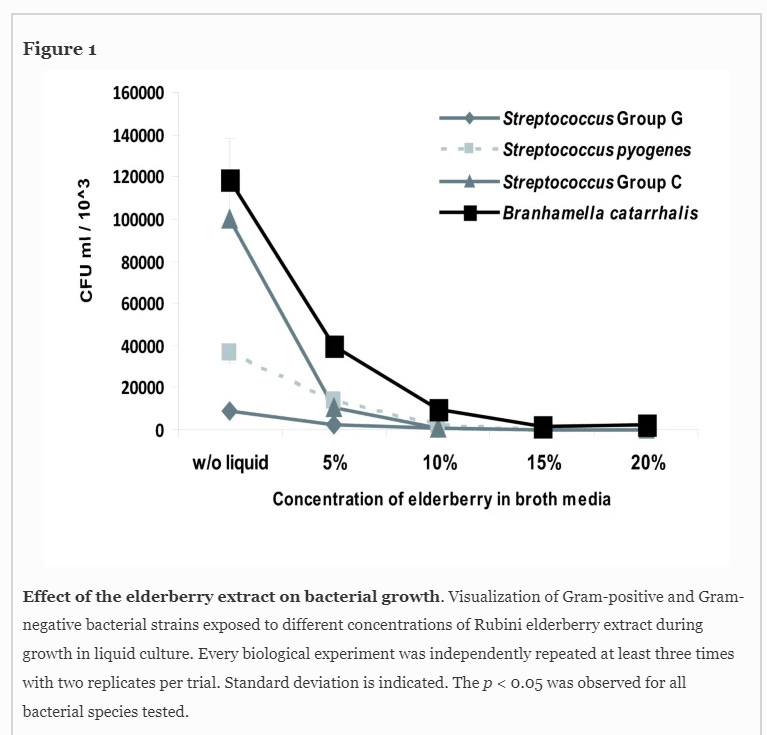
My Take…
The following is a personal anecdote.
Elderberry is the only supplement that I don’t allow to “run out” in the household. Our family has been using Elderberry since the fall of 2020, and this arose in the context of the COVID-19 pandemic and the need to protect our kids.
I approached Elderberry with skepticism, having never heard of it before. We initially bought Elderberry gummies on the recommendation of several Edmonton parents and found that our kids, ages 8 and 10, responded positively to them almost immediately. Over time, we shifted to Elderberry syrup, which remains, to this day, their favorite medication or supplement by far.
Over the last 3 years, we’ve gone through several viral respiratory infections at home. Both kids tend to respond partially to Elderberry within 24 hours (occasionally their mild symptoms are gone the next day). By 48-72 hours, they’re typically well enough to return to school. One or two stubborn viral infections have lingered a bit longer, usually a few more days. That would have been the “COVID-19 Delta era”.
3 years. No flu vaccines. No COVID-19 vaccines. No COVID-19 testing. Healthy kids.
I have been taking Elderberry supplements in capsule form, along with Quercetin, Zinc, NAC, Olive Leaf, Vitamin D/C throughout the pandemic but I must admit that even I sneak in some Elderberry syrup now and then, usually to address some cough that persists a bit longer than I’d like.
This stuff simply works. Of course, as a physician, I would love to see more studies done on kids and Elderberry extract but they’re not happening. In light of the Universal push to get toxic, experimental mRNA vaccines into kids, this is not surprising.
There are thousands of testimonials from parents on Elderberry gummies or syrup on Amazon. Here is one from a random Elderberry product:
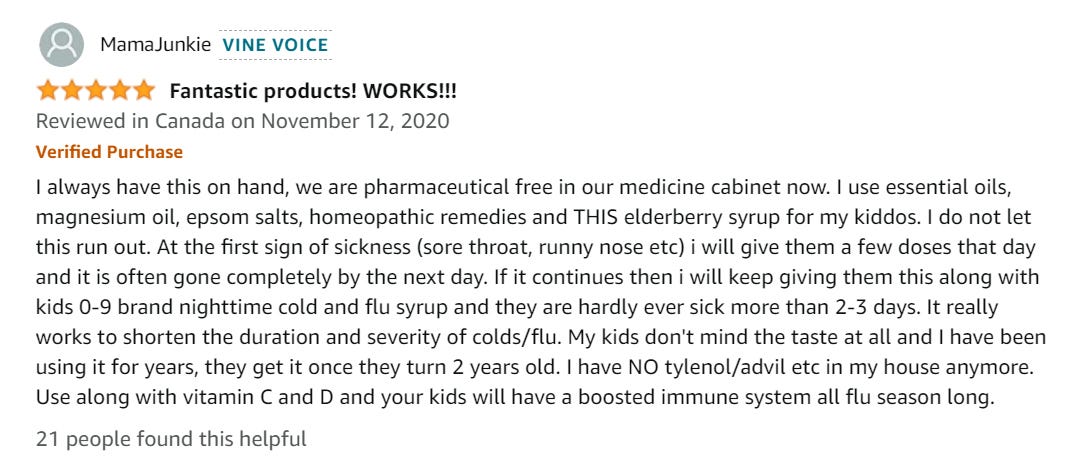
The line that struck me: “I have NO tylenol/advil etc in my house anymore”.
Here in Canada, last year, we had such a shortage of children’s Tylenol and Advil that in Edmonton, the shelves were bare for months and it was not possible to find them anywhere (click here).
Nevertheless, we were quite comfortable with Elderberry, and didn’t feel the impact of the shortage of children’s Tylenol or Advil. And that’s a great place to be in, as a parent.
Going forward, I’m particularly pleased with the fact that Elderberry not only acts against various Influenza virus types but specifically against H5N1, which concerns me as one of the viruses that may “emerge” as a future pandemic.
It’s good to know that the kids have something to protect them, no matter the “scariant” or pandemic that we get hit with in the future.
*
Note to readers: Please click the share button above. Follow us on Instagram and Twitter and subscribe to our Telegram Channel. Feel free to repost and share widely Global Research articles.
Dr. William Makis is a Canadian physician with expertise in Radiology, Oncology and Immunology. Governor General’s Medal, University of Toronto Scholar. Author of 100+ peer-reviewed medical publications.
Featured image is from Children’s Health Defense
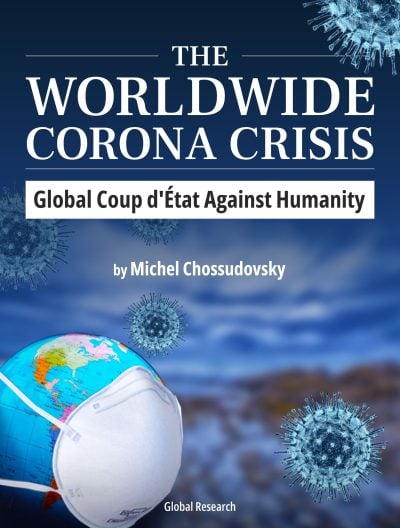 The Worldwide Corona Crisis, Global Coup d’Etat Against Humanity
The Worldwide Corona Crisis, Global Coup d’Etat Against Humanity
by Michel Chossudovsky
Michel Chossudovsky reviews in detail how this insidious project “destroys people’s lives”. He provides a comprehensive analysis of everything you need to know about the “pandemic” — from the medical dimensions to the economic and social repercussions, political underpinnings, and mental and psychological impacts.
“My objective as an author is to inform people worldwide and refute the official narrative which has been used as a justification to destabilize the economic and social fabric of entire countries, followed by the imposition of the “deadly” COVID-19 “vaccine”. This crisis affects humanity in its entirety: almost 8 billion people. We stand in solidarity with our fellow human beings and our children worldwide. Truth is a powerful instrument.”
ISBN: 978-0-9879389-3-0, Year: 2022, PDF Ebook, Pages: 164, 15 Chapters
Price: $11.50 FREE COPY! Click here (docsend) and download.
We encourage you to support the eBook project by making a donation through Global Research’s DonorBox “Worldwide Corona Crisis” Campaign Page.

